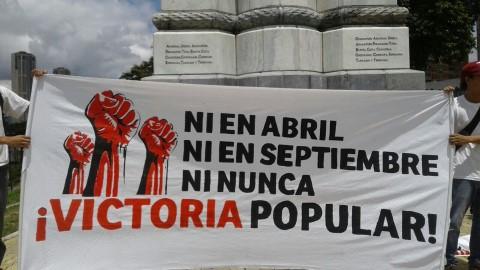What is really happening in Venezuela?
The MUD should remember that, while it has a clear external support, it would have to rebuild conditions of governability inside the country, something unthinkable if at least 5 out of 10 Venezuelans continue to support the legacy of Chávez.
- Opinión

Venezuela has figured in all the media around the world for a number of years. If with Hugo Chávez, the Caribbean country was already permanent news, following his death, with the intensification of attempts (both legal and illegal) to separate Chavism from Miraflores (the presidential palace), the country is daily on the front pages of the main international newspapers, with growing quantities of distorted and Manichaean information. Venezuela has become, as was Cuba some decades ago, the new "bad word" in international relations, with the objective of forcing a change after more than fifteen years of Chavism in that country, with the aim of further consolidating the regional right-wing after it has reached the government in Argentina and Brazil (this latter through a parliamentary coup).
When the opposition to Maduro, grouped in the heterogeneous MUD, conquered the National Assembly last December, they promised that in six months they would bring the PSUV government to an end. This, in the words of the President of the National Assembly, the veteran leader Henry Ramos Allup. In these months, in addition, this country suffered the most serious moment of the economic crisis, with the steep descent of international oil prices (a variable that is beginning to change due to an agreement among the OPEC countries) and with growing difficulties for the food supply. The government devised an initiative that allowed it to partially get around the adverse scenario, although with enormous difficulties: this was the CLAP, Local Councils of Supply and Production that were set up as a bypass -- such as Chávez had done with the Missions with respect to the State -- to the private distribution of food, where even today there is ample evidence of hoarding.
Nine months have gone by and the right, that has great external support and its alliance with numerous media outlets internally, has still not managed to conquer Miraflores. What factors have made this impossible? There are several:
a) Contrary to Brazil, the MUD does not control the judicial power nor the Vice-presidency of the country. Nor the armed forces. A formula along the Brazilian lines "à la Temer" is unthinkable.
b) Chavism has permeated the identity of a great part of the Venezuelan people, even under adverse conditions. This is the case even among those who could be "disillusioned" with the present state of affairs. The opposition consulting firm Datanalysis, in a recent survey, indicated that at least 5 out of each 10 Venezuelans continue to support the legacy of Chávez. Hinterlaces, for its part, shows that there is a progressive recuperation of pro-government support as a result of the new economic initiatives.
c) The opposition continues to indicate two clear tendencies, in a situation similar to that of 2014: one sector is pro-dialogue and the other openly rupturist and demanding to “heat up the streets” again. Capriles, who belonged to the first group two years ago, now appears to share a more confrontational line, like the one he led in 2013, after the victory of Maduro. This struggle, far from being left aside after the victory of MUD in December, is still on the table and even accentuated. One camp blames the other for the fact that Maduro is still in Miraflores and vice versa. The more radical sectors, led by Tintori and Machado, are seeking an antichavist insurrection for which there are apparently no objective conditions in the medium term, as was demonstrated above.
d) The progressive rise in international oil prices and an improvement of indicators such as the country risk appear to demonstrate that an economic rebound is possible after months of profound complexities. On the first element, the recent trip of Maduro through the OPEC and non-OPEC countries has established a basis for agreements that make it possible to foresee a growth of expectations at the beginning of next year.
To conclude, with Christmas and the coming vacations getting close, an imminent "institutional overthrow", as proposed by one sector of MUD, seems far from probable. The referendum also appears to be a long way off, since the right needs to re-gather 1% of signatures in the 5 challenged states. Nevertheless, there will be new attempts to legitimize the strategy of "heating the streets", above all from the international perspective: the regional conditions -- above all with the new governments in Argentina and Brazil, -- are clearly distinct from 2014, when the guarimbas tried to overthrow Maduro. But the MUD should remember that even when it has a clear external support, it would have to rebuild conditions of governability inside the country, something unthinkable if at least 5 out of 10 Venezuelans continue to support the legacy of Hugo Chávez, as we have indicated. Ultimately, they can attempt to erode and de-legitimize a government from far away, but they cannot govern (and be elected) only with explosive declarations of the OAS.
(Translated for ALAI by Jordan Bishop)
- Juan Manuel Karg, political scientist at UBA, international analyst, researcher with CCC.
Del mismo autor
- Brasil: Caída de un país líder 11/06/2019
- La estocada de Moreno a Unasur 15/03/2019
- Mantener la paz en Sudamérica 12/02/2019
- El sueño de Xi Jinping, la pesadilla de Trump 11/01/2019
- La posverdad es el prefascismo 30/10/2018
- Por qué ganó Bolsonaro 10/10/2018
- Brasil: una elección decisiva 21/09/2018
- Diez puntos sobre la elección en Brasil 08/08/2018
- AMLO, el persistente 03/07/2018
- Un nuevo ciclo podría empezar 06/06/2018
Clasificado en
Clasificado en:
Desestabilización
- Rosa Miriam Elizalde 15/11/2021
- Francisco Domínguez 11/08/2021
- Clara Sánchez 04/08/2021
- José Manuel Zelaya rosales 30/07/2021
- Francisco Domínguez 21/07/2021
